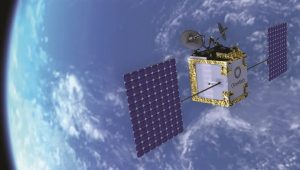Eutelsat has announced a strategic decision to delay the deployment of significantly upgraded OneWeb broadband satellites. Instead, the company will concentrate on enhancing continuity of service for customers with long-term contracts. This shift in approach, according to Eutelsat CEO Eva Berneke, will reduce nearly one-third of the company's previous $4 billion budget earmarked for a second-generation constellation.
Speaking during an earnings call, Berneke emphasized that this strategy adjustment allows Eutelsat to remain eligible for potential public sector funding from initiatives like IRIS², Europe's sovereign broadband project. This funding could support the development of new technologies to enhance the constellation.
Berneke highlighted the importance of maintaining service continuity for customers in multi-year contracts. Following tests with a OneWeb Gen 2 technology demonstrator last year, Eutelsat is in discussions with manufacturers regarding a constellation of approximately 300 satellites, with deployments potentially commencing in 2025.
While most of OneWeb's current generation satellites were launched between 2020 and 2023, with a design life extending to around 2027-2028, Eutelsat did not specify the number of satellites under its revised strategy.
The operator has suggested that a Gen 2 constellation could be smaller than Gen 1, partly due to newer satellites leveraging Eutelsat's geostationary satellites over high-demand areas.
Regarding financing, Eutelsat is in talks with government-backed export credit agencies in India, the United Kingdom, and France to cover the majority of Gen 2 costs. The planned expansion of OneWeb's commercial services globally would also support this investment.
While all satellites needed for worldwide coverage are in position, delays in the ground segment are currently hindering global services. Eutelsat now expects to have completed only 90% of OneWeb's ground network by the end of June, following installation and licensing setbacks. This delay impacts key enterprise and government customer markets eagerly awaiting services, such as India and Saudi Arabia.
Despite these challenges, Eutelsat reported around 700 million euros ($754 million) in OneWeb customer backlog as of the end of December, up 23% from three months earlier.
Services from recently launched geostationary satellites, such as Konnect VHTS and Eutelsat 10B, have contributed to Eutelsat's return to growth, with revenue for the six months to Dec. 31 up 1% compared to the same period in 2022.
Video was the only business unit that did not post revenue growth, falling 8% year-on-year to 331.1 million euros. This was due to non-renewed and scaled-down broadcast contracts, along with sanctions against Russian and Iranian channels.
On the other hand, government services, mobile connectivity, and fixed connectivity saw growth of 10.5%, 35.6%, and 9.2%, respectively. Adjusted EBITDA stood at 365.6 million euros on Dec. 31, down 12.7% compared with a year earlier.
Photo: OneWeb
